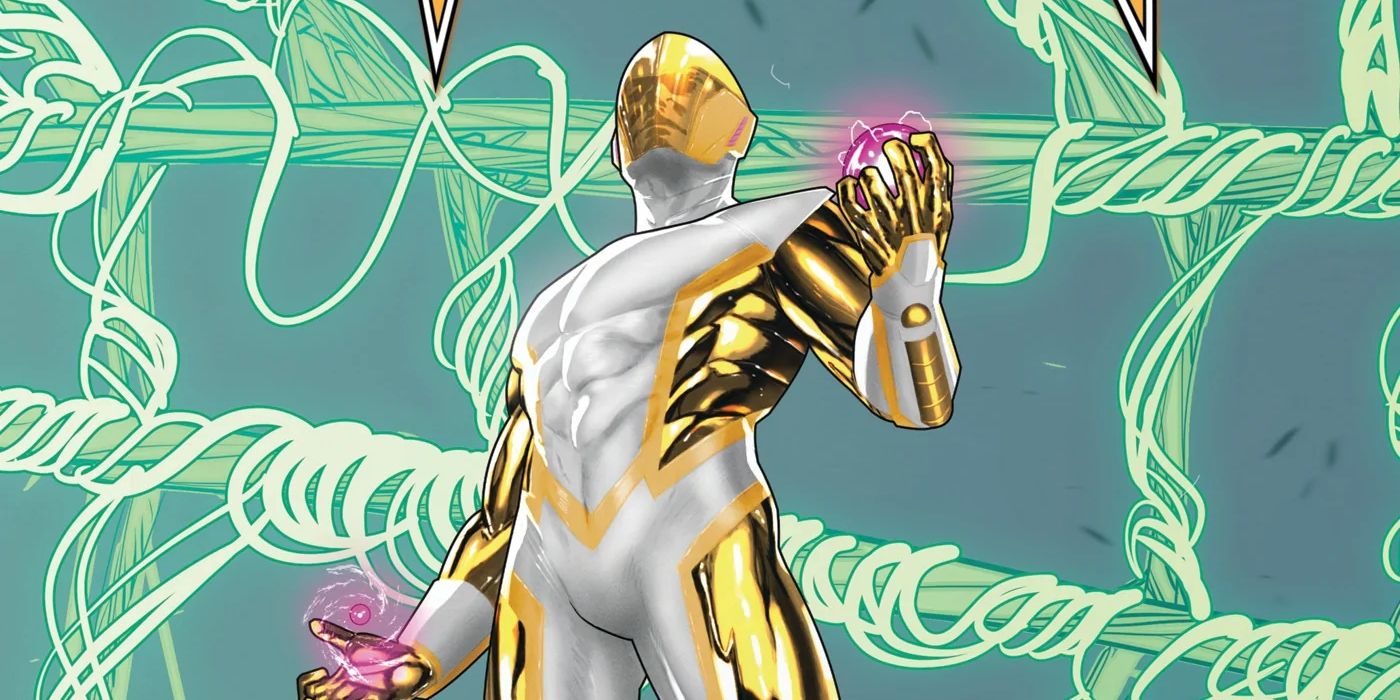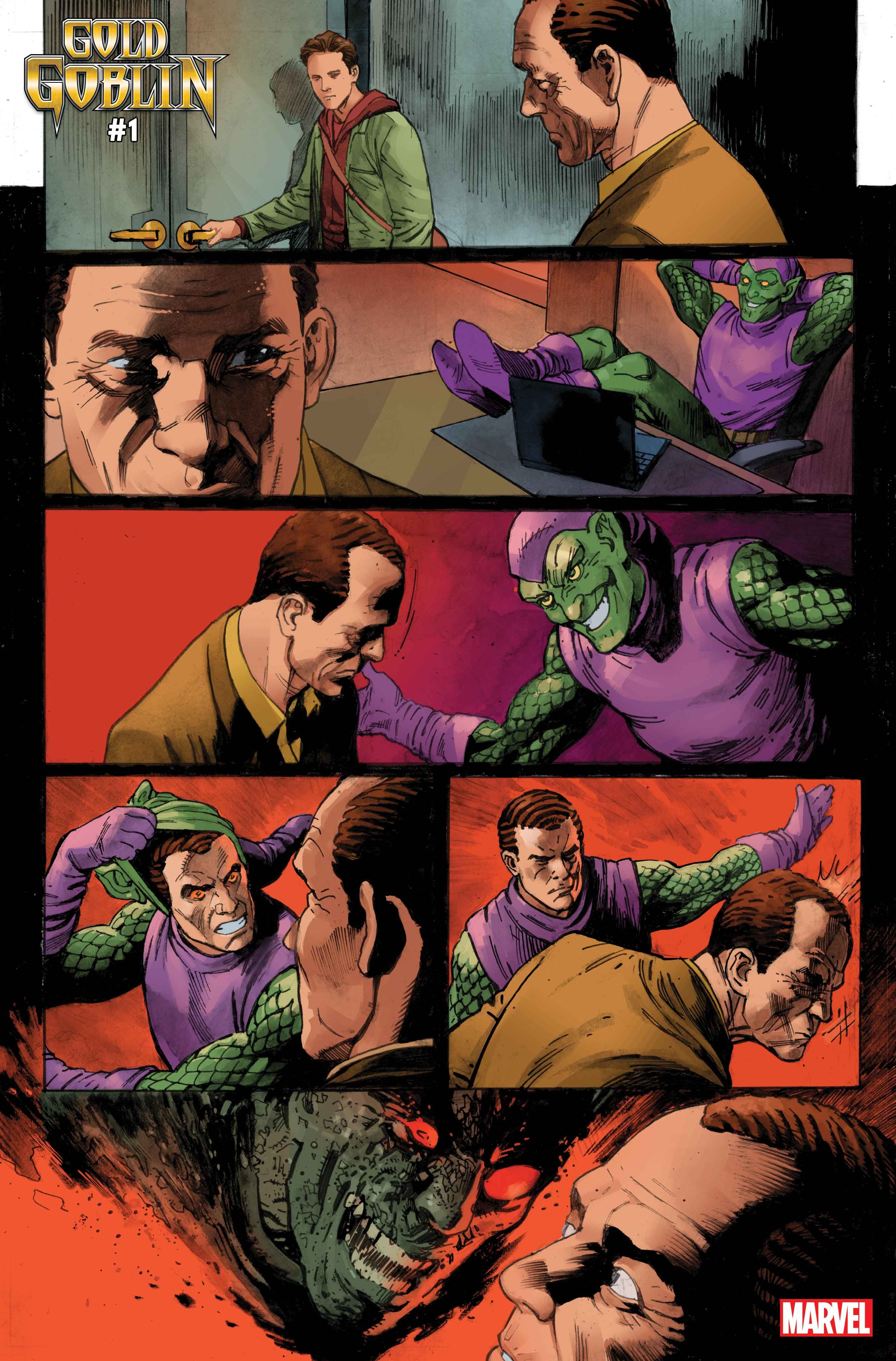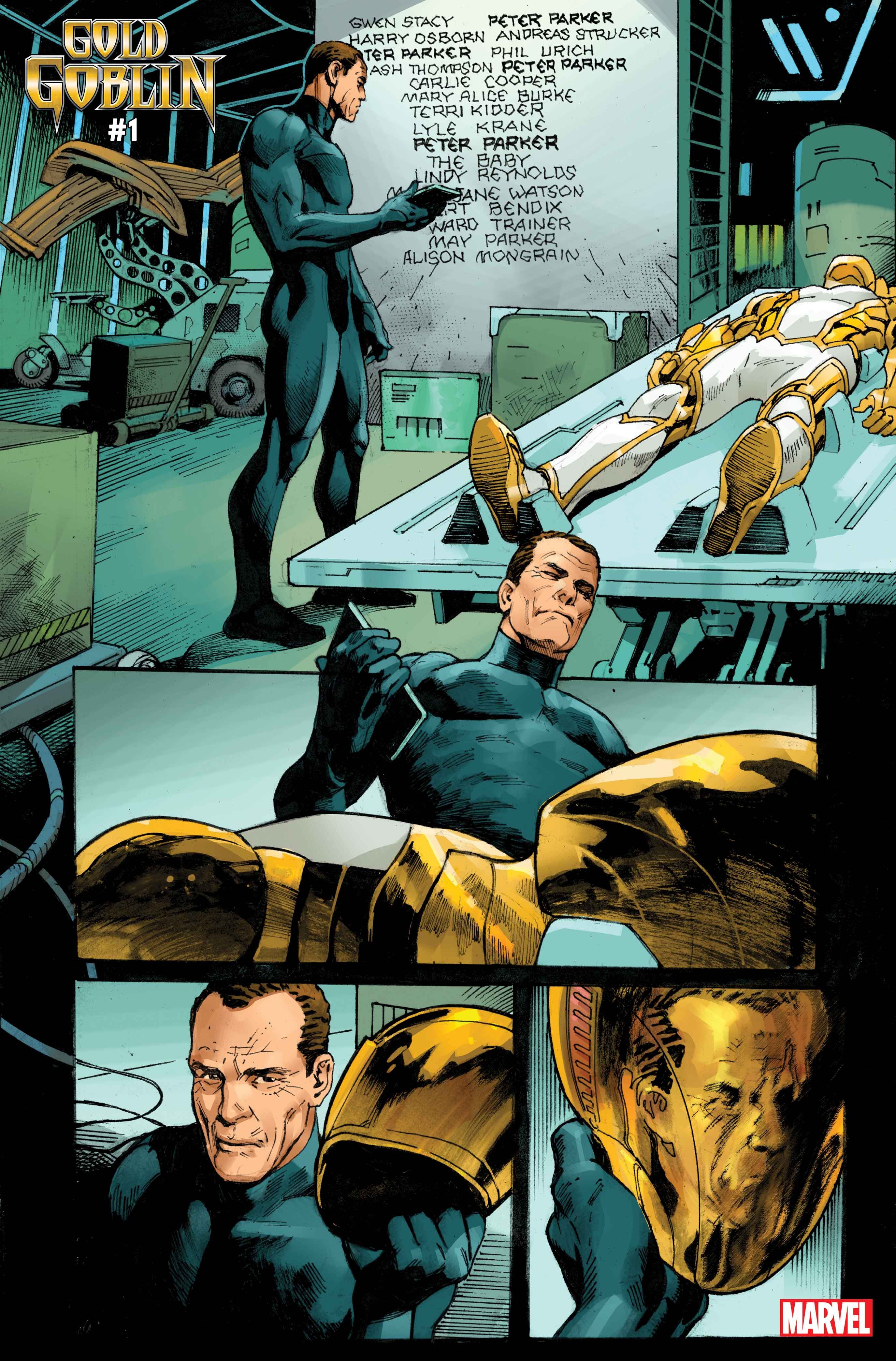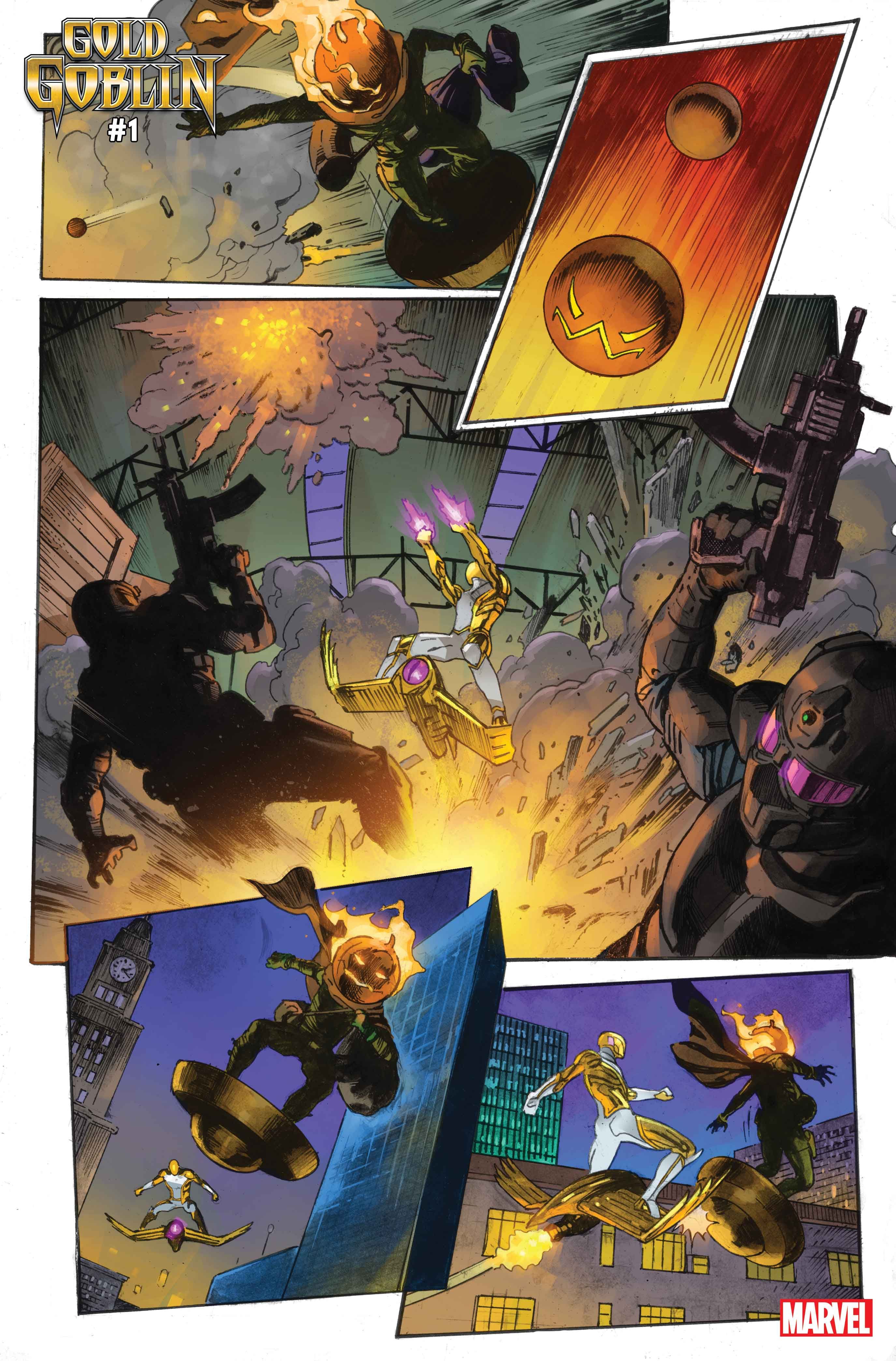One of the most unexpected results of Nick Spencer's run on Amazing Spider-Man was the conclusion of his Sin-Eater storyline. Using his ability to take the powers of others by shooting them down and restoring them with newfound humanity, Sin-Eater brought down lots of villains in quick succession -- including Green Goblin. But Norman hasn't simply returned to his former ways. He's retained a newly discovered guilt that drives him to assist his former mortal enemy however he can.
This will even extend into a new costumed identity for the character, leading the former Green Goblin to try his hand at heroism as the Gold Goblin. Ahead of the debut of the new Gold Goblin series, writer Christopher Cantwell sat down with CBR to discuss the differences in his approach to Norman Osborn compared to other Marvel characters he's tackled. He also talked about finding surprising amounts of empathy for the former Green Goblin and hinted at the internal focus at the heart of Norman's latest step into the spotlight. Marvel also shared a preview of four pages from Golden Goblin #1 drawn by Lan Medina and colored by Antonio Fabela.
CBR: Starting off, let's get this out of the way -- seeing Norman Osborn as a hero is an inherently odd concept.
Christopher Cantwell: I know. It doesn't feel right -- it's like oil and water. I feel like I had an easier time having Doctor Doom do heroic things than Norman because I feel like there are two different types of villains. I feel like Victor Von Doom at least has his own code of honor, which may seem extremely dishonorable to others, but he has a kind of unbending code for himself. He has a love for his people, even if sometimes he doesn't treat them the best. He has his nationalism. He has an ideology. Norman is just this twisted motherfucker who's just ambition and greed and a twisted, warped view of so many things. He has this tunnel vision and this hatred for Peter. He seems like much more of a sick and twisted villain than Victor ever has been -- and Victor has done some really horrendous stuff.
I was really excited to dive into the character and do something -- it's funny, he's trying to be a hero, but what does that even look like? So in a way, I wanted to really look at his motivations. Why he would do that, and then how would he go about it? If we're going to be internal with Norman, then to still have it feel warped and horrific and difficult and clouded. What do you do when you take somebody who's so horrendous to their core, erase that evilness because of the Sin-Eater, and then have him try to fill it up with something better? Is that even possible? I mean, I think [that's] the central premise of the book.
As you said, it's not like all the things Norman has done have been forgotten. He still has all this baggage and history, despite the golden suit. How tricky is it to take on this version of Norman without losing sight of who he's been?
That's what I think is interesting. I think that was the first thing that I needed to crack about the book. For me, the thing I hooked into immediately is that so much of Norman's biography and his identity is wrapped up in the awful things he's done. When you take those away, what is left? So for him, it's him realizing that there's very little of the man that isn't tied to [his] sins.
I thought what would be interesting for him is for the first time in his life, even if the sins are gone, as you said, the baggage [and] the memories are still there. He's never felt guilt weighing him down. So he's going to get that now that he's been gifted this moral conscience. It's crushing him. His sickness is now taking the form of guilt over all the horrible things he's done. To have them be just behind his eyes, all day every day, as he's trying to be [a] "good person."
So his attempts to be heroic are all kind of motivated by a real dark sense of guilt, almost an obsessive guilt. That's the way I've written it. He just can't stop seeing and feeling the horrible things he's done his whole life. He's really trying to fill up the vacancy and the vacuum he feels inside himself with something different, something better, something good. But it's such a vacuous hole that's been left. He's so plagued by memory and guilt. He's having a hell of a time just getting through the day. I mean, he's not happy. He's not suddenly Mr. Hero. We're really internal in his book, in his mind. He's seeing things, and that guilt is manifesting, and he's just really plagued by all of it for the first time. So that's what felt fresh for me, for Norman to be feeling that and then motivated by that drive to do something good.
I love that you've essentially given Norman his own version of Peter Parker's motivation, his obsession with making up for his past mistakes.
I feel like Peter feels bad for everything he feels he got wrong. Of course, he's gotten a lot of things wrong. But Peter also doesn't give himself the benefit of the doubt. He never lets himself off the hook. Now it's Norman who is not letting himself off the hook. He really has a lot to answer for, and he's done some terrible things. In this book, at least these first five issues, the idea was for him to arc in a way where we get him into a place where he's not just motivated by guilt and fear of how awful he is. What does it mean for him to actually do something good and to actually help someone? That is really the journey for him.
This is such a character study book, where you delve into Norman, what makes him tick, and how he sees himself. What surprised you the most about Norman as a character?
It's interesting. Again, I'll compare him to Victor because it's somebody I've written about the most in terms of villains. I feel like it's easy to find empathy for Victor. I thought it would be much harder to find empathy for someone like Norman because there's a revulsion with Norman. I mean, the Goblin identity itself is this kind of abject evil. I have been a little stunned at how I can immediately feel empathy for Norman, just as much as I do for Victor -- where you live in his head, and you're like, "Yeah, I get it." What a terrible, suffering existence this guy must have. I mean, this life of not just villainy, but cruel evil that he's inflicted on people... He's just awash in it. He doesn't want it, but he's trapped by it. It's too late. Or is it?
Can a man like that, who has done those things, be redeemed? Is there real forgiveness in that, and can it originate in the self? Where does it come from? Does it come from Peter? Does it come from Liz? Does it come from Normie? Does it come just in the way that these people look at him? You can already sense his discomfort, and I think that that that's the key for me. I'm very proud of it. I mean, it was funny -- Doctor Doom was kind of the real first thing I wrote for Marvel, and it got nominated for an Eisner, and then I feel like I've been chasing that. I killed myself on Iron Man. And now we're getting... People caught on to that run a little bit later into the book, appreciating it for what it is. But it did take some time.
I mean, which is also a bummer because my run ends in two months? I'm very proud of where we're getting to take Tony. [Marvel] gave me such a long heads up, I got to build a whole kind of final coda and arc for him. With Issue 25, which is also #650 with Legacy Numbering -- I get to tell this one-shot like, you know, those classic grocery store one-shots we loved when we were kids. I got to do that with him. That's this very intimate story, and then to hand off to [Gerry Duggan]. He's gonna go do something incredible, and it'll be awesome to read, so I'm excited about that.
I also [like] Victor. It was interesting, but I think [with] Gold Goblin, it's funny because he's in his shiny gold costume. But this book, for me, is infinitely uglier. Just on an emotional level, even though Norman's trying to be a hero. He is sincere. It's not bullshit. He's not trying to pull a fast one on anybody. But the sincerity is what makes it such an ugly story. He's in turmoil, you know? [Norman] is so utterly confident in what he does. Tony less so, and Peter, even less so. Tony is an egomaniac in some regards, Peter really has no ego. Now you've got Norman -- who was an egomaniac and has been changed overnight and just can't handle it. He's got this kind of spiritual schizophrenia going on.
He still has those kinds of like motor memory outbursts of anger and ego, but at the same time, he has nothing to fall back on. He's questioning everything he's done. This can be a fun book. Lan Medina's drawing some incredible pages -- I mean, just gorgeous, gorgeous stuff. We've got Jack O'Lantern coming in. There are all these goblin concepts clashing. But at the same time, there's a real theme of self-hatred in this book. That's Norman's character. I feel like I had to give that to him for him to feel sympathetic and empathetic in these hero-ing attempts.
What did you bring to your comics work from the world of film and television?
Comics is its own medium. Comics get nailed down because you've got to ship. That's interesting. But I will say that the visual part of storytelling has been very helpful for me. I always defer to the artists. I always go, "If you have a better way of showing this, please go for it." I'm very visually descriptive in my scripts, and I think that the sense of pacing and economy has helped when it comes to writing. Figuring out how to pack a lot into a little, how to make those pages potent, and how to make those moments land. It's its own beast.
I'm not the director of the book. I'm the screenwriter, right? For a comic, I think that whether it's Lan, Martin Morazzo, or Salvador Larroca, it's like I'm working with the best directors. I'll suggest something in the scripts, just like I do in a screenplay. But if the director puts the camera in a better place, I'm usually blown away by it. They're like, "Watch this." And here's this incredible mural that enriches and elevates the emotion that you're trying to get across. So much more. If anything, I'm always amazed by cinematographers and directors on TV and film sets. You know, unless it's myself, and then I'm disappointed. I feel the same way with artists. So I've carried over my awe at other people's talents, as opposed to my modest amount.
Gold Goblin #1 debuts on Wednesday, Nov. 16, 2022.





